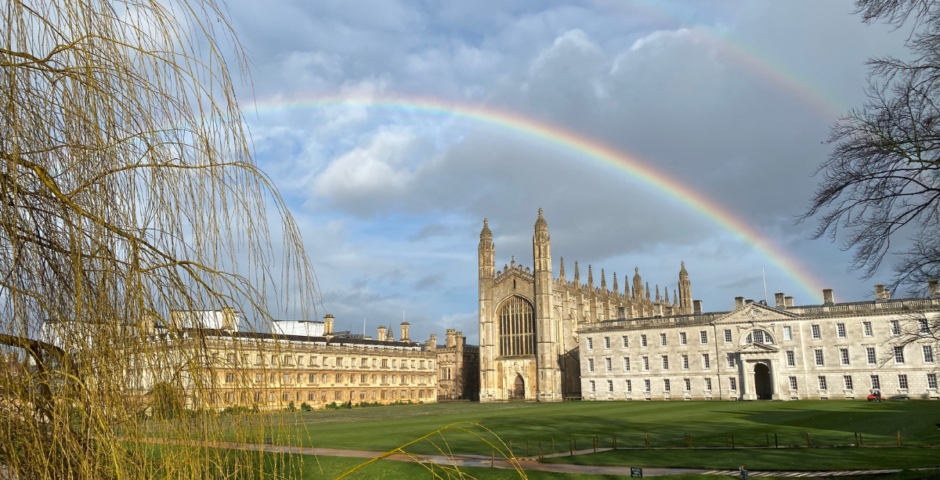
Poem of the Week: ‘On Leaving Cambridge’ by Xu Zhimo
A poem which explores the connections between China and Cambridge by a poet whose life was famously immersed in mystique
Deviating slightly from our usual theme, this week’s poem has captured the minds of many students studying the Chinese literary tradition and can be found carved into a stone of white Bejing marble, now in the grounds of King’s College. Xu Zhimo’s On Leaving Cambridge, composed in 1928, is a reflection of his time at Cambridge and his love of English Romantic poets, both of which inspired him to combine the literary worlds of the East and West in an entirely novel way.
Zhimo’s image today is entangled in a culture of mystique and romanticism. Famously reluctant to be constrained by traditional norms, he considered his arranged marriage to be a barrier to free and simple love, and his string of love affairs attracted large levels of publicity at the time. Though tragically killed in a plane crash at just 34 years of age, in culture and in Chinese school syllabuses Xu’s poetry is still emblematic of the so-called ‘May Fourth’ movement, which in literary terms aimed to depart from the Classical Chinese poetic form.

The Xu Zhimo Memorial (image credit: Lily Knighton)
Softly I am leaving,
Just as softly as I came;
I softly wave goodbye
To the clouds in the western sky.
輕輕的我走了,
正如我輕輕的來;
我輕輕的招手,
作別西天的雲彩。
Xu’s view in the poem is from the Backs of King’s College, shifting variously from the River Cam, to the greenery surrounding it, to the clouds and light above. Nature and peace dominate the poem, predictably subjects drawn from the tradition of English Romantic poetry. Though some have characterised this poem as excessively saccharine, it is in its very simplicity that the sentiment of its author can be marked and his view painted more clearly, as in the following lines:
That pool in the shade of elm trees
Holds not clear spring water, but a rainbow
Crumpled in the midst of duckweeds,
Where rainbow-like dreams settle.
那榆蔭下的一潭,
不是清泉,是天上虹;
揉碎在浮藻間,
沉澱著彩虹似的夢。

The Backs of King’s College (image credit: Ruth Pavey)
Furthermore, interactions between viewer and viewed are all-important and become so intrinsically linked that, as the poem goes on, they almost merge entirely: the ‘reflections on the shimmering river’ extend to ‘my heart’, just as his own ‘farewell music’ of peace is reflected in the silence of the crickets.
Yet now I cannot sing out loud,
Peace is my farewell music;
Even crickets are now silent for me,
For Cambridge this evening is silent.
但我不能放歌,
悄悄是別離的笙簫;
夏蟲也為我沉默,
沉默是今晚的康橋!
Through a focus on such authentic human emotions as he reflects on in this poem, Xu was able to make a shift from Classical to Vernacular Chinese. The latter, termed ‘baihua’ (白話) and begun in 1917 by the philosopher and historian Hu Shi, was a style of writing designed to be more accessible to the common people. Its gradual appearance in textbooks, journals and newspapers caused changes in Chinese cultural life, and constituted one of the major aims of the May Fourth movement.

Image credit: Keira Quirk
Xu’s memorial garden in King’s College, the three-year project and vision of Senior Horticulturalist Steven Coghill, is the first Chinese garden created inside the grounds of a Cambridge college. Beyond celebrating the fusion of Eastern and Western cultures, the plants found inside are native Xu’s home in the region of Haining. The garden’s landscape, then, works in tandem with the poem of its dedicatee to draw on the themes of the natural world, intense nostalgia, and the sense of time ongoing.
That’s all for this week’s (slightly altered) poem of the week feature! We are always on the look-out for your submissions, so please keep emailing them in to [email protected]. We can’t wait to hear from you!
Feature image credit: Matilda Head









































